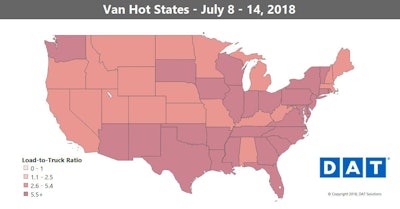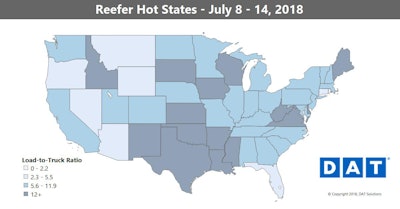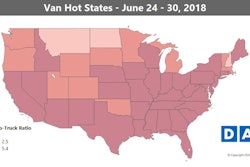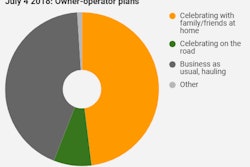Freight markets often begin to slide in mid-July, and last week’s national metrics fit the normal seasonal trend. Truck posts on DAT load boards outpaced load posts last week, with more haulers back in action after some taking time off for the Fourth of July.
That’s a signal that the red-hot demand we’ve seen in recent weeks has cooled a bit, but it’s probably a stretch to call the slide a “slump.”
 Freight rates in a lot of places are still historically high, even if a whopping 81 of the top 100 van lanes had lower average prices last week.
Freight rates in a lot of places are still historically high, even if a whopping 81 of the top 100 van lanes had lower average prices last week.Hot van markets: Rates were down almost everywhere, but there were big increases in volumes out of Los Angeles, Chicago and Memphis. That could lead to more stable pricing. This is also a big week for e-commerce promotions, designed to boost sales during what’s usually the off-season for retail. In years past, that’s led to higher truckload volumes as well.
Not so hot: Last week, the biggest declines were on lanes that are closely associated with retail demand. For example, dry van shipments between Memphis and Columbus, Ohio, paid less in both directions. The biggest drop was on the lane from Columbus to Buffalo, N.Y., down 53 cents to a still-high average of $3.71 per mile.
 The season retail demand fall and its bite out of the lane between Memphis and Columbus can be combated by taking advantage of better prices elsewhere. Recently, the Memphis to Columbus direction on the roundtrip is the higher paying lane at an average $2.92 per mile. The return trip from Columbus to Memphis was down to $1.93 last week. Add a haul going from Columbus to Chattanooga, Tenn., a lane that lane averaged $2.59 per mile last week, and you ought to be able to find freight there that’s moving heading back toward Memphis. Those loads averaged $3.03, making the total rate per loaded mile on the three-leg round $2.84 – 41 cents higher than the Memphis-Columbus round trip. Not counting deadhead, it’s about 200 extra miles, and if you can make it work with your hours, more than $1,000 in extra revenue.
The season retail demand fall and its bite out of the lane between Memphis and Columbus can be combated by taking advantage of better prices elsewhere. Recently, the Memphis to Columbus direction on the roundtrip is the higher paying lane at an average $2.92 per mile. The return trip from Columbus to Memphis was down to $1.93 last week. Add a haul going from Columbus to Chattanooga, Tenn., a lane that lane averaged $2.59 per mile last week, and you ought to be able to find freight there that’s moving heading back toward Memphis. Those loads averaged $3.03, making the total rate per loaded mile on the three-leg round $2.84 – 41 cents higher than the Memphis-Columbus round trip. Not counting deadhead, it’s about 200 extra miles, and if you can make it work with your hours, more than $1,000 in extra revenue. Reefer load counts have beat a retreat from Spring highs the past couple of weeks. Prices and volumes dropped sharply in the Southeast, while it’s more of a mixed bag in California and the middle part of the country.
Reefer load counts have beat a retreat from Spring highs the past couple of weeks. Prices and volumes dropped sharply in the Southeast, while it’s more of a mixed bag in California and the middle part of the country.Hot reefer markets: There were a couple bright spots. Strong volumes out of southern Idaho pushed rates higher out of Twin Falls. This year also appears to be a strong one for strawberry harvests out of Salina, Calif., just south of the San Francisco Bay Area. Blueberry harvests are also driving demand out of Elizabeth, N.J.
Not so hot: Florida is all quiet now, and rates tumbled on lanes like Lakeland to Atlanta, down to $1.49 per mile on average. Sacramento, Calif., probably hasn’t hit peak pricing yet, but prices on the lane to Denver fell back to earth last week, down 61 cents to $2.58 per mile.









